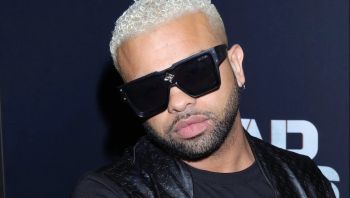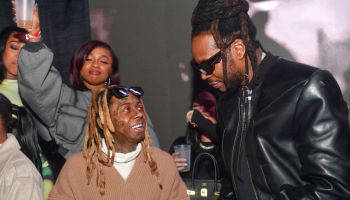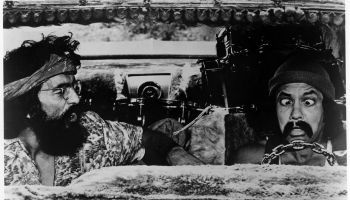Let’s skip the formalities and get right into this. Yes, I am disappointed with Pharrell’s cover art for his highly-anticipated album, G I R L.
But don’t call me angry.
I’m not necessarily thrilled that he decided to name an album G I R L and the best example of diversity he could find of women was a white model with auburn locks.
But don’t call me outraged.
It’s also not a clever idea to model the cover after a show that has been criticized for their exclusion of black women and purposely not have any women of color represented in the art.
But don’t call me bitter.
For starters, black women aren’t in Lena Dunham’s narrative, so the lack of women of color on her hit HBO show is less of an erasure than it is her truth. I get that. And the album art might not even be a nod to the series, although the aesthetics are similar. Still, Pharrell should have known better. He usually does. Like African writer Leopold Senghor suggested, African [American] art doesn’t have the luxury of being art for art’s sake. It’s always didactic. And failing to represent women of color as a black man, well, what lesson do we have here?
These are valid frustrations. But what Twitter did today, pushing Pharrell to trending topic status by discussing the “triviality” of three white women gracing the cover of the Producer of the Year’s album, did something even more damaging than the cover art itself — it invalidates the VERY REAL historical concerns and frustrations of VERY REAL black women.
Let me set the record straight — the underrepresentation of black women on the cover is an extension of the conspicuous lack of our positive images in the media. It’s not surprising. The normality of accepting the European standard of beauty and celebrating such isn’t some novel idea that just came to light by way of Pharrell’s project. And the argument that there’s a “maybe-biracial” woman on the cover certainly does bring up the long-standing fight against colorism, but miss me with that — I’ve been dealing with colorism since the time I realized my skin was light and my brother’s was a dark brown. I was three. This is old news. And I don’t have time to be outraged because of something Pharrell did when America does it to me every day.
By the way, if you’re so very confused about the frustrations colorism ignites in the black community, maybe Toni Morrison’s “The Bluest Eye” or some Alice Walker literature can help you. Google is also your best friend.
The point is, I can use countless other examples of the erasure of black women in media and in society without citing Pharrell’s album. That, I want you to know. In the grand scheme of things, it’s just another carrot to add to the pot. My sentiments, like many others, were simple, clear and legit — we’re annoyed and aware of our omission from media. And we’ll point it out until we feel like it’s an issue that’s been resolved.
But Twitter users, specifically black men, made that nearly impossible. A real dialogue on the erasure of black women was pushed aside when they bogarted a conversation about our struggles as black women and cited, with resolution, that we were “really fucking angry, bitter bitches” with nothing else to do but “complain.” As if we needed their permission to feel the way that we do. And to back up their claims that black women are “fake outraged” for no good reason, Twitter descended and relentlessly retweeted a few tweets from women (namely writer and activist dream hampton) that voiced their disappointment.
She didn’t say she was angry. She didn’t use caps. She didn’t refuse to utter the name Pharrell in the way she has banished the presence of Trayvon Martin’s killer on her timeline and in her life. She simply said she sees what’s going on here, and she’s not too happy about it. And she got beat up for it.
And in the end, women all over Twitter got beat up for it. The consequence of voicing black exclusion in media was a tongue-lashing defended by black men who argued that these issues aren’t real issues for the black women in their lives. In black communities. In their own lives.
Instead of listening to our concerns, we’re told that it isn’t that serious. We’re chastised for supporting a show with black representation (Scandal) because Kerry Washington’s character is dating a white man (which is futile ammo and an apples and oranges conversation). We’re told we stan too hard for Lupita N’yongo and her flawless, dark skin. We’re told to shut the fuck up and stop being divisive.
Our frustrations didn’t garner the support we provide during times of black men’s turmoil. They didn’t use Twitter as a vehicle to effect change, instead they used it as an opportunity to spew black women vitriol and attack. And the lack of backing from a group of people whose struggles most closely mirror ours is the real beef. Colorism and underrepresentation are issues that don’t need validation. They are real and always have been.
But your support would have been nice.
So call me angry and outraged on that and that alone. Pharrell is the mirage. He’s the symptom, not the disease.
As one of my black male followers told me today, “the ‘fake outrage’ has to end at some point.” So does the hate and lack of advocacy for black women.
But I’ll wait. Self hate takes some time to correct.
Christina Coleman is the News and Politics Editor at GlobalGrind and a Howard University Alumna. Prior to this she was a science writer. That explains her NASA obsession. She crushes on Anthony Bourdain. Nothing explains that. Follow her on Twitter @ChrissyCole for all things news & politics.















